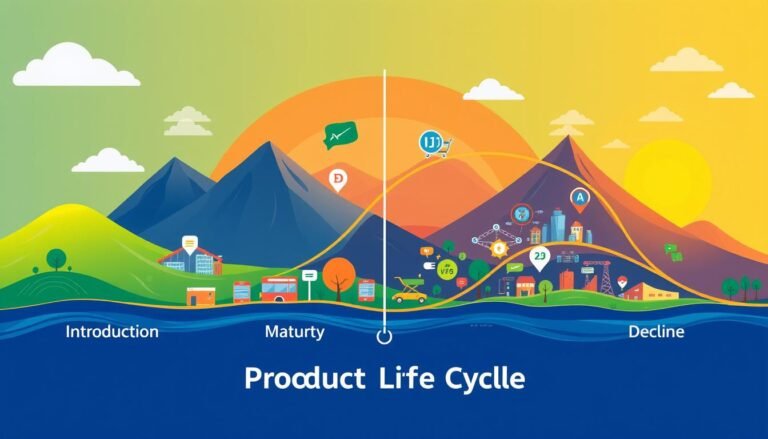The Philosophical Roots of Marketing
Did you know there are over 100 ways to define marketing? This fact, shared by Gibson et al. (1993), shows how complex marketing is. It’s not just about promoting and selling things. It’s linked to how we act and what we value in society, making it a key part of business philosophy.
Marketing has changed a lot over time. It started in the social sciences, as Bartels (1951) and Alderson and Cox (1948) pointed out. By the 1950s, especially in the USA, marketing became more structured. People like Kotler, McCarthy, and Borden helped shape today’s marketing management.
According to Baker (2000), marketing has gone through three main stages. The first was around 1850, when the mass market began. Then, by 1960, the modern marketing concept emerged. By 1990, marketing moved from focusing on single transactions to building relationships. These changes show how marketing has evolved over time.
Key Takeaways
- Marketing has over 100 definitions, showing its complex nature.
- Social sciences have greatly influenced marketing theory.
- Marketing has changed a lot, from mass market to focusing on relationships.
- Important figures like Kotler, McCarthy, and Borden helped shape marketing management.
- Marketing’s evolution shows its deep connection to human behavior and societal shifts.
Introduction to Marketing Philosophy
The core of marketing philosophy looks into what drives consumer behavior. It helps marketers make strategies that really speak to their audience. At its heart, it’s about understanding the ‘why’ behind what consumers buy. This knowledge lets businesses create strong advertising philosophy and marketing strategies.
There are key philosophies that guide how products are made, promoted, and sold:
- Production Concept: This method aims to make lots of products at low prices to boost sales. Ford’s Model T changed the car industry by making cars affordable for everyone.
- Product Concept: This focuses on making high-quality products, even if it costs more. Apple is a great example, making products that people want because they are top-notch.
- Selling Concept: This strategy uses aggressive sales and promotions, sometimes ignoring what customers really need. It might bring in sales quickly but can hurt customer happiness and loyalty over time.
- Marketing Concept: This approach uses deep research to understand and meet customer needs better than rivals. It builds strong customer relationships, like Amazon does with its wide product range and great service.
- Societal Marketing Concept: This goes beyond traditional marketing by focusing on social responsibility. It makes sure businesses help society and the planet. Patagonia is a brand that really cares about the environment.
As what consumers want changes, a holistic marketing approach becomes key. It means all parts of a business work together towards a common goal. This shows a deep understanding of advertising philosophy and marketing strategies.
Good marketing philosophy connects with consumers on a deep level. It tells stories that touch on feelings like joy and fear. Campaigns like Betty Crocker’s cake mix use these emotions to bond with people. This shows how knowing what consumers really want is crucial for marketing success.
The Evolution of Marketing Thought
Marketing has gone through many changes over time. Each change shows how society and business have evolved. From the early days of mass production to today’s focus on building relationships with customers, marketing has changed a lot.
The Emergence of the Mass Market
In the 1920s, the US saw a big leap in production technology. This led to making lots of products quickly and cheaply. Companies started to see customers as a big group, making products for everyone.
Scholars like Peter Drucker saw this as a big change for marketing. It changed how companies thought about selling things.
The Modern Marketing Concept
By the early 1960s, marketing became a science. It moved from just making and selling to understanding what customers want. People like Philip Kotler and Ted Levitt showed how important customers are to a business.
The marketing management school became popular, focusing on real-world applications. This led to making products that fit different people’s needs.
From Transaction to Relationship Marketing
The 1990s brought a big change from just selling things to building relationships with customers. Now, companies work on making long-term connections with customers. This change has led to new ways of working together and making products.
Experts say marketing needs to be both profitable and ethical. Research and courses in universities help keep the conversation going.
Marketing as a Business Philosophy
Marketing is all about meeting customer needs to make them happy. It’s different from just selling things. By focusing on what customers want, companies can build strong long-term business relationships.
Concern for Customer Needs
A good marketing plan starts with knowing what customers really need. It means doing lots of research and listening to what people say. This way, companies can make products that really help customers, leading to new ideas and solutions.
For example, tech companies always update their products to meet customer needs. This shows how focusing on quality and performance can keep customers happy.
“Satisfying human wants and needs through the utilization of scarce resources is a key objective of economic organization, with marketing playing a pivotal role.” – Economic Principles
Building Long-term Relationships
Moving from just selling to building relationships changes how companies talk to customers. This shift is about making real connections that last. By being honest and building trust, companies can keep customers coming back.
Take fast food, for instance. They keep customers loyal by always doing better than the competition and meeting customer needs. This approach builds strong customer loyalty over time.
The idea of societal marketing takes this even further. It means companies think about how they can help society too. Brands might give back to charity or use green practices to appeal to customers who care about the planet.
The Influence of Social Sciences on Marketing
Marketing is a field that combines many sciences, including marketing psychology, sociology, and anthropology. These sciences help marketers understand why people buy things. They are key for making marketing successful.
“In the early stages (1900-1910) of marketing thought, the focus was on facts about the distributive trades. Concepts of the market discussed include demand reflecting desire and ability to purchase, and the market’s capacity to adjust to equilibrium automatically.”
Marketing psychology looks at how our minds and feelings affect what we buy. Knowing what drives a customer’s choice helps marketers make better ads. It’s key for spotting what moves people emotionally and behaviorally.
Marketing sociology looks at how society, like culture and family, shapes what we buy. It’s important for marketers to understand how groups influence buying habits.
Marketing anthropology studies how culture and setting affect what we buy. By studying different cultures, marketers can make ads that connect with people on a deeper level.
A study in August 2022 looked at how social influence affects what we buy. It used a special framework and analysis to show how social factors impact our choices. The study found that things like social norms and information from others can make us buy more or impulse buy.
Adding social sciences to marketing helps us understand and influence what people buy better. By combining insights from psychology, sociology, and anthropology, marketers can create strategies that really speak to people. This makes marketing more effective and relevant.
Plato’s Perspective on Marketing
Plato looked into marketing and found insights that still help us today. His ideas are deep and practical for marketers now.
Plato’s Analysis of Marketing Systems
Plato saw marketing as key for a healthy society. He believed it helps meet people’s needs by sharing production. His *Tripartite Theory of the Soul* says our choices come from three parts: intellect, spirit, and desire.
He thought dividing tasks based on what people are best at makes things run smoothly. Marketing is vital for this, matching what people want with what’s available. This makes sure goods get to those who need them.
Ethics and Marketing in Plato’s Laws
In his work, Laws, Plato went deeper into marketing’s ethics. He saw marketing’s good sides but warned of dangers like *deception* and *greed*. *Marketing ethics* are key to avoid these issues.
Experts like Meyer (2003) say bad actions in marketing show in the environment it creates, not the marketing itself. Marketing lets people show if they act ethically or not.
Plato on Marketing intermediation
In ancient Athens, the Agora was a big market where middlemen were key. Plato saw their value, thinking they were vital for trade. Even with debates on marketing jobs, Plato believed these middlemen kept goods moving in society.
This view shows how important intermediaries are in *Plato’s marketing philosophy*.
Consumer Behavior and Marketing Philosophy
Understanding how people act as consumers is key to making smart marketing plans. By looking into psychology, sociology, and anthropology, we learn a lot about what drives consumer trends. These insights help us see what shapes their choices.
The Role of Psychology
Consumer psychology shows us what makes people decide to buy things. It looks at how our minds, feelings, and past experiences guide our choices. Marketers use this knowledge to make ads that speak directly to us.
This approach helps make marketing more personal and builds stronger connections with customers. It also makes people more likely to stick with a brand over time.
The Impact of Sociology and Anthropology
Sociology and anthropology help us see how society affects what we buy. They look at the big social and cultural forces that shape our shopping habits. By understanding these forces, marketers can make ads that really speak to people.
This way of thinking also helps spot new trends in the market. It makes sure marketing stays relevant and hits the mark with consumers.
By combining these views, we get a full picture of the consumer. This is crucial for reaching out to people in a meaningful way. Using insights from psychology and sociology helps businesses deal with the complex world of today’s consumers.
The Philosophical Roots of Marketing: Key Insights
Marketing is more than just a business tool; it’s a deep dive into human behavior and needs. Aristotle’s ideas on cause and effect laid the groundwork for modern science. This thinking is key to understanding how marketing works and how to make it better.
“Aristotle’s empirical approach and emphasis on causality laid the foundation for the scientific method, critical for technological advancements and the expansion of scientific knowledge.”
Friedrich Nietzsche’s “will to power” idea is big in marketing too. It’s about human drive and creativity, which is what makes new marketing ideas happen. Marketers aim to push boundaries and meet consumer needs in new ways.
“Friedrich Nietzsche’s concept of the ‘will to power’ highlights the human drive for ambition and creation, which aligns with the essence of innovation and the motivation to explore new territories.”
Immanuel Kant’s ideas on what we see versus what’s really there help marketers think differently. They push us to look deeper into what drives consumers. This is key to making marketing that really connects with people.
Relationship marketing is all about building lasting bonds with customers. It’s about:
- Customer Satisfaction: Going beyond what customers expect to keep them coming back.
- Customer Retention: Keeping customers loyal to your brand over time.
- Customer Loyalty: Getting customers to spread the word and stay with your brand.
- Customer Relationship Marketing (CRM): Keeping in touch with customers to increase their value to your business.
Being ahead of the competition and making the most of each customer’s lifetime value are big goals. Experts say focusing on the customer is the best way to stay ahead.
By blending philosophy, science, and business know-how, marketing leaders today focus on ethics and innovation. This approach is key to meeting today’s consumer needs.
The Ethical Dimension of Marketing
In today’s market, being ethical in marketing is a must. Ethical ideas like utilitarianism, deontology, and virtue ethics guide marketing plans. Utilitarianism looks at the outcomes of choices to help the most people. Deontology sticks to rules like honesty and justice. Virtue ethics looks at the moral character of those making marketing choices.
Ethics in Marketing Strategies
Meeting consumer needs and making a profit is key to marketing ethics. Companies like Apple Inc. show how to do this with ethical marketing. Being open and honest in ads can really help build trust with customers. Research by Tsalikis and Fritzsche (1989) shows how different ethical theories guide marketing decisions.
Consumer Trust and Corporate Responsibility
Marketing ethics also means building trust with customers for lasting relationships. A survey by Nash (1991) found many companies in the U.S. and Europe have ethics codes. Even though ethical issues affect all types of organizations, they’re especially tough for those with less money and power.
Looking at marketing through an ethical lens helps balance making money with doing right. Smith and Quelch (1993) talked about how marketing managers should act with strong ethical values. This way of thinking is key to doing well in today’s market, where being ethical matters a lot.
Source Links
- Philosophy and Theory of Marketing
- What marketers can learn from philosophers
- Marketing Management : What are Marketing Philosophies? Elaborate with example.
- Marketing Philosophies
- Marketing Management Philosophies – 5 Marketing Concepts
- THE MARKETING CONCEPT
- Marketing Concept | Meaning, Types & Examples – Lesson | Study.com
- Social influence research in consumer behavior: What we learned and what we need to learn? – A hybrid systematic literature review
- Philosophical Marketing: What can Plato’s Republic teach us about marketing?
- Microsoft Word – JBTP-V5N3-p198.docx
- 1.4 Evolution of the Marketing Concept – Principles of Marketing | OpenStax
- The Philosophical Roots of Innovation: Unveiling the Impact of Thought Leaders
- Marketing in the 21st Century
- Marketing Strategies for the Ethics Era







